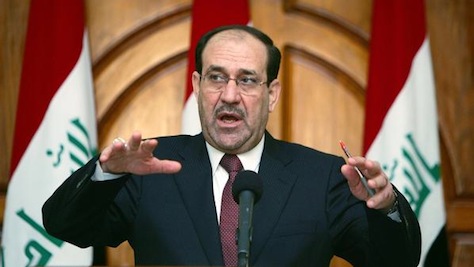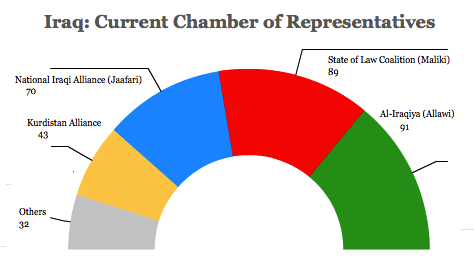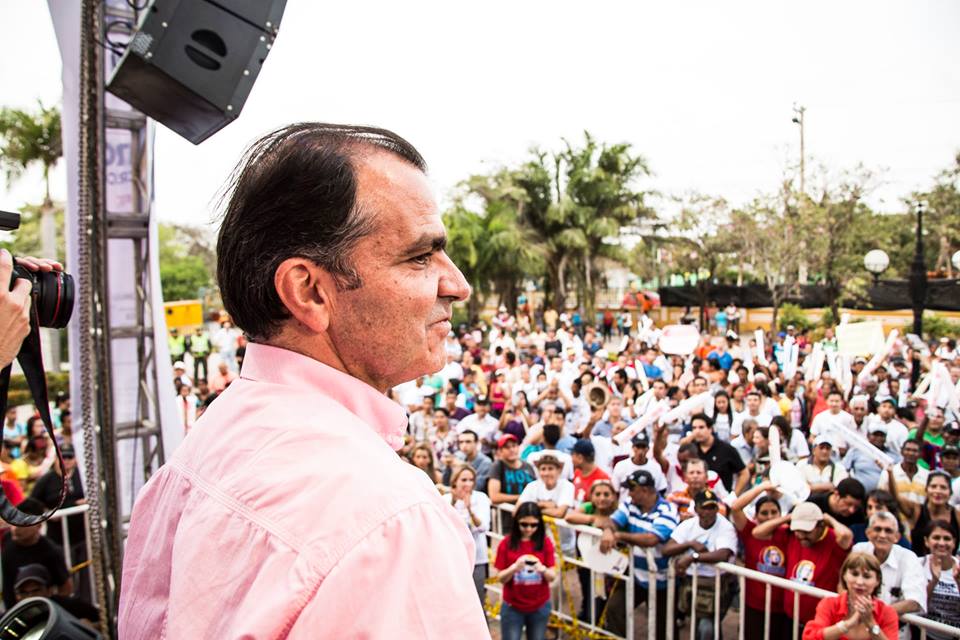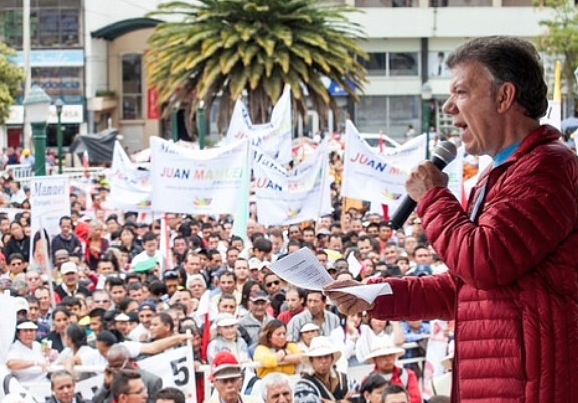Though Iraqis voted on April 30, it took the better part of May for election officials to announce the results, which appear to be good news for Iraqi prime minister Nouri al-Maliki.![]()
![]()
Heading into the elections, Maliki led a coalition of mostly Shiite parties, the State of Law Coalition (إئتلاف دولة القانون), dominated by Maliki’s own Islamic Dawa Party (حزب الدعوة الإسلامية). Maliki could rely on 89 seats in the 325-member Council of Representatives (مجلس النواب العراقي), Iraq’s unicameral legislature, but he governed as the head of a larger ‘national unity’ coalition after running on a broadly cross-sectarian, nationalist platform in the 2010 elections.
Iraqis, tired from the fierce Sunni-Shiite violence between 2006 and 2008, seemed weary of fighting, and the Iraqi political scene was then turning toward nationalism and away from sectarianism.
In those elections, Maliki’s State of Law coalition was actually bested by Ayad Allawi, a Shiite former prime minister who led a Sunni-dominated, cross-sectarian coalition, ‘al-Iraqiyya,‘ the Iraqi National Movement (الحركة الوطنية العراقية).
Allawi, however, wasn’t as successful as Maliki in building a governing coalition, so Maliki remained prime minister.
Here was the Chamber of Representatives on the eve of elections:
In the past four years, Iraq has witnessed a return to sectarian violence. After US forces left the country at the end of 2011, terminating a bloody eight-year military occupation, Iraqi security forces struggled to maintain the period of relative calm in which the 2010 elections took place.
Instead, by the beginning of 2014, Maliki was regrouping after radical Sunni militias had taken control of parts of western al-Anbar province, including its largest city, Fallujah. Militias are also taking advantage of the Syrian civil war to stir mischief on both sides of the Syrian-Iraqi border. The rise in Sunni-Shiite tension comes as relations between the northern Kurdish autonomous government and the central Iraqi government are also fraught over the issue of oil revenues.
* * * * *
RELATED: What is happening in Iraq, Fallujah and al-Anbar province?
* * * * *
Meanwhile, Iraq’s ‘national unity’ government has performed horribly. With corruption running rampant, and with minister more concerned with turf than performance, the country faces daunting problems — power outages, a weak non-oil economy, massive unemployment among a rapidly growing youth population, tax collection failure, among other problems.
So in 2014, Maliki ran a campaign designed to maximize votes within his own Shiite Iraqi community — and it’s a strategy that seems to have worked:
Maliki’s State of Law Coalition actually increased its share of the seats in the Chamber of Representatives from 89 to 92.
As Zaid al-Ali, a former legal adviser to the United Nations in Iraq writes in his excellent new book, The Struggle for Iraq’s Future: How Corruption, Incompetence and Sectarianism Have Undermined Democracy, the immediate results matter less than the fact that Iraq’s politics are stunted by elites who shuffle for power at the expense of governance:
Under the current constitutional and legal system, elections will not produce any real alternatives to Iraq’s ruling elite. The fortunes of some parties may rise, while others may see their popularity wane somewhat; but the chances of anything emerging outside the current crop of incompetent and corrupt politicians are vanishingly small…. In all likelihood, Iraqis will choose to stay away from the polls in increasing numbers, leaving the politicians to play an aggrandized version of musical chairs while everyone else just watches.
Maliki wins contest among Shiite Iraqis
Maliki’s focus on winning Shiite votes effectively turned the 2014 election into a contest among competing Shiite groups, most notably the Islamic Supreme Council of Iraq (ISCI, المجلس الأعلى الإسلامي العراقي), headed by Ammar al-Hakim, and the Sadrist Movement (التيار الصدري), headed by Muqtada al-Sadr, the former militia leader who returned to Iraq after four years of self-exile in Iran (and who, ostensibly, made a fuss earlier this year over his ‘retirement’ from Iraqi politics). Continue reading Maliki bloc leads after Iraqi parliamentary election results announced





